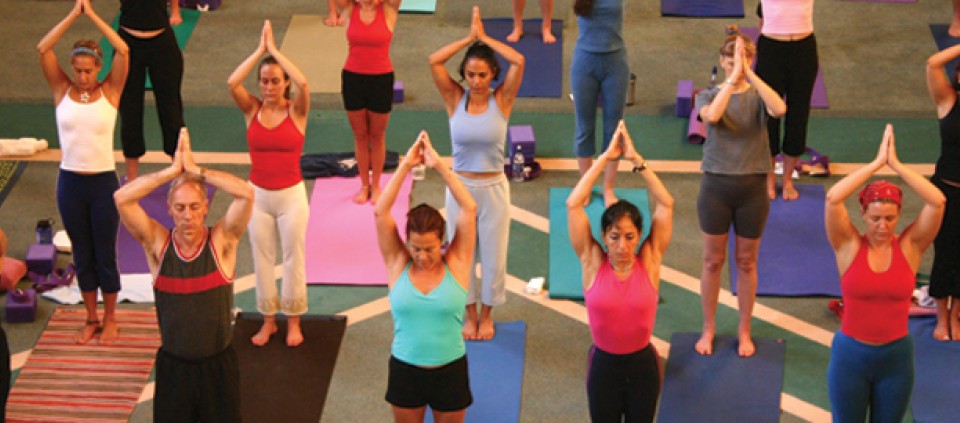When Yoga Meets Positive Psychology

by Susanlee Mascaro
As yoga teachers, we learn the postures with an eye for fine-tuned alignment. We are passionate about absorbing all the many facets of yoga: pranayama, meditation, yama and niyama, yoga nidra. The space we teach in becomes sacred space, and we treat it with a quiet reverence. We each bring our own style of teaching and particular interests, knowing that it is all yoga, the union of breath and movement. We are a community of like-minded people who breed love and compassion and bring it out into the world.
Imagine that dedication to our calling lifted to an enhanced level of well-being, a place where inner peace prevails. Where the turmoil of life is blended with joyful moments of pure acceptance. Where, by slowing down, we produce more. Where there is a heightened level of energy, vitality, serenity, and commitment to increasing our happiness. This is what I discovered through the Certificate in Positive Psychology (CiPP) training with Tal Ben-Shahar, Kripalu’s first program blending on-site and online components.
When I took the 200-Hour Kripalu Yoga Teacher Training in 2001, it was a life-changing experience, filled with joy, community, and hard work. Over the next four years, I progressed through the 500-hour certification. The CiPP course validates and enhances everything I learned during my yoga teacher trainings. Tal and his faculty members show us how to build on that learning to raise our happiness level a notch or two—or, if we are really diligent, three. The process validates our efforts and encourages us to delve deeper, to love what we are doing when we are doing it, and to be examples of love, spirituality, and inner peace. Tal reminds us of how we got to where we are, and gives us tools to raise our levels of joy and bring that ease of well-being into our communities. We are given poignant quotes, breath-awareness and yoga exercises, meditation inquiries, and statistics on evidence-based research, all of which we can bring into our yoga classes.
My CiPP journey started with baby steps of change. We were taught that “small changes make a big difference,” and that they require consistency in effort—creating rituals around the things that we want to change. My first ritual was going to sleep at the same time every night, making an attempt to get more rest. Sound simple? Not always—I often have to resist the urge to stay up later. Yet I’ve made the commitment and am doing the work to keep all my new rituals in place. Is it perfect? Of course not. Tal encourages us to grant ourselves “permission to be human,” and, for me, that dovetails with Swami Kripalu’s belief that “the highest spiritual practice is self-observation without judgment.”
Bringing rituals into the classroom allows my students to feel more at ease, more at home. It’s comforting to know that we are going to start with pranayama, warm up the joints, move into postures, and end with Savasana and meditation. Healthy habits take away uncertainty, expand comfort zones, and encourage present-moment thought processes. These repetitions give my students the confidence to create a practice at home.
CiPP has opened my eyes to the fact that we are all alike; only our situations are different. I already knew this intellectually and spiritually, but this training has brought me to a feeling place of knowing. No one escapes pain and suffering, we all experience joy and contentment. It is all part of human nature. My empathy levels have increased—I see myself in my students’ struggles and in their euphoria in asana.
Journaling is a key part of the Positive Psychology commitment. Now I keep pens and clipboards in my studio and encourage the students in my men’s yoga class to journal after Savasana. I learned in CiPP that journaling releases tension, brings a sense of manageability, meaningfulness, control, and predictability, especially in men. It enhances the immune system and positive mood. They are intrigued, and I hope to continue this ritual.
The transformation that I feel at this halfway point in the CIPP training is very subtle and very real. My students feel it, too, and are taking steps to incorporate small changes in their lives that make a big difference.
Susanlee Mascaro is a 500-Hour Kripalu Yoga teacher and a fundraiser for nonprofit organizations. A mother of five and a grandmother of four, she lives in Trooper, Pennsylvania, with her husband, Pat.
© Kripalu Center for Yoga & Health. All rights reserved. To request permission to reprint, please e-mail editor@kripalu.org.